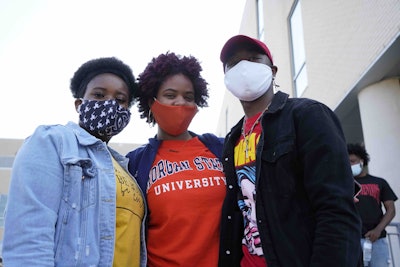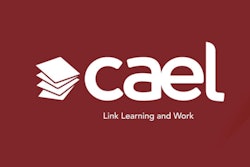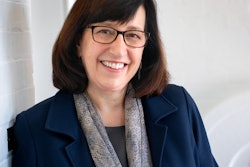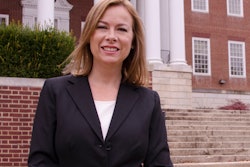As higher ed leaders look to the fall, eager to revert to a sense of “normal” for students, faculty and staff alike, many are facing a new question: With COVID-19 vaccines now largely available, should they require their campus communities to get vaccinated?

In late March, university officials reported “a noticeable uptick” in COVID-19 cases on campus, which they said was consistent with the uptick in the surrounding county. University of Michigan students accounted for 15% of all county cases as of March 30.
“It’s a very different situation and we think the numbers will continue to improve,” Fitzgerald says. “Just a few weeks ago … Michigan was leading the nation with new infections. [But] we are seeing great response to the vaccine clinics that were available on and off campus. We believe that later this summer we will see that a significant number of members of our community will be vaccinated.”
As a result, university officials decided to mandate that all students living on campus in fall 2021 would need to be vaccinated before moving into the dorms. But others — including faculty and staff and nonresidential students — are still being encouraged to get the vaccine.
“It wasn’t that we decided they don’t need to be vaccinated,” Fitzgerald says. “It was that we took a narrower view on who we were going to require to be vaccinated. … There’s a school of thought that encouragement is as effective or even more effective than mandating.”
University of Michigan leaders are leaning heavily on their school of public health and university healthcare system — including vaccine clinics — to help educate the campus community on why they should get the vaccine, but Fitzgerald says that in “a big, decentralized community” many decisions are left up to individual schools, colleges and units on campus.
Cultural considerations
In the Atlanta University Center Consortium (AUCC), leaders are taking a completely different approach. Though Clark Atlanta University, Spelman College, Morehouse College and Morehouse School of Medicine all operate as separate institutions with separate leadership teams, presidents of the AUCC institutions thought it was important to act as a unit because of the close proximity of the campuses.
Dr. Valerie Montgomery Rice, president of Morehouse School of Medicine, has been very active in leading the public awareness charge around communities of color and the vaccine, and she convinced her colleagues the science was sound. Now, all four of the historically Black institutions are requiring all students, faculty and staff be vaccinated before returning to campus next semester.
Eli Phillips, executive vice president and chief operating officer at Clark Atlanta University, says that decision was influenced at least in part because of the greater toll the COVID-19 pandemic has taken on the African American community.
“COVID hit the African American community very hard, and we are very susceptible to having very severe reactions to the virus, so we are very aware of that,” Phillips says.
“What we [decided] may or may not be the right decision for every institution of higher education, but we are a close-knit community [and] we cannot logically
 A student’s temperature is checked at Morgan State University.
A student’s temperature is checked at Morgan State University.rationalize it if all are not [vaccinated]. It just didn’t make logical sense,” he adds. “We reached a conclusion that we really needed everyone to be vaccinated, because we want to bring everyone back on campus for in-person classes, for running our administrative and academic operations, and we wanted to resume our fall sports. …”
Morgan State University, a public historically Black institution in Baltimore, is also requiring its entire campus constituency to be vaccinated before returning to campus in the fall. Dr. Anita Hawkins, co-chair of the university’s vaccination management team and an associate professor in the School of Community Health and Policy, says she believes the cultural perspective cannot be understated in how universities are managing the decision.
Hawkins says that, for Black families, “our households are often intergenerational. It’s kind of hard to separate you from your family, your larger family and network. … From younger generations to older generations who might be more vulnerable in some ways to infection, it’s just recognizing we have that larger responsibility to understand this affects not just ourselves, but our larger community.”
The majority of residents in Baltimore, and particularly around the university community, are Black, and Hawkins says the same recognition of the disparate effects of the pandemic that impacted the leaders’ decision in Atlanta also factored into Morgan’s decision.
“We often talk about rights, but we don’t talk about responsibility — a responsibility to be protective of the larger community,” she says. “That is a cultural frame that is embodied in the university as an HBCU, just at our core in terms of our foundation.”
Steve Clark, vice president for university relations and marketing at Oregon State University (OSU), says OSU leaders are “doing our best to understand the complexity in our society around vaccinations,” particularly within “communities that may not have had good experiences with medical care providers.” Oregon State is also requiring all students, faculty and staff be vaccinated before returning to campus in September 2021, and Clark says the university is working to “help inform in a community-based way, rather than an institutional way” why vaccines are important as part of a comprehensive approach to public health and wellness.
Finding ‘normal’
At Oregon State, scholars have concentrated research efforts to better trace and understand the spread of the COVID-19 virus. They’ve conducted random door-to-door sampling in communities across the state to gauge infection prevalence and have undertaken extensive wastewater testing to determine the presence of viral markers that give clues to how many cases might exist in an area.
“Wastewater out of a building, like a residence hall, can give you a sign that something’s amiss — the viral markers decreasing, that’s a good thing,” Clark says. “But if it’s going up, then we have a problem with someone or something in the residence hall,” in which case, the university follows up with rapid COVID-19 testing to pinpoint the source.
At Clark Atlanta University, students who returned to campus in the spring were required to take COVID tests twice a week, and employees who came on campus were required to test once a week. The institution’s positivity rate has been less than 1%, which Phillips calls “phenomenal” — compared to a 5% positivity rate in the broader county, and closer to 10% in the state of Georgia as a whole, according to Phillips.
University officials at all the institutions are still figuring out what students’ return to campus will look like. “Everything is still very fluid and changing constantly,” in terms of guidance from the U.S. Centers for Disease Control and Prevention and developing medical information, Phillips says.
Fitzgerald points to the rapidly changing nature of information — and even the availability of vaccines — as an indication that plans will likely be under revision right up until students arrive back on campus.
“August is a long time away but it isn’t,” Fitzgerald says, adding the UM team continues to “emphasize the need to be nimble moving forward. This pandemic has really shown us that we need to be flexible.”
Fitzgerald adds that the campus community has been informed it still may be necessary to wear masks indoors on campus in the fall. Also, in the fall, “There may still need to be some social distancing. We’ve already told students that large lecture classes will be delivered remotely, but small and medium-sized classes will be in person.” Some dorm rooms are being reserved for necessary quarantining and isolation should positive cases arise, says Fitzgerald.
This article originally appeared in the May 27, 2021 edition of Diverse. Read it here.















